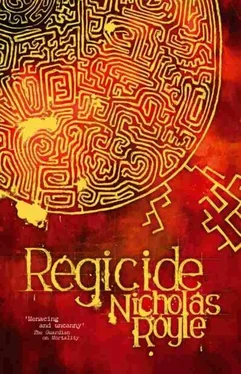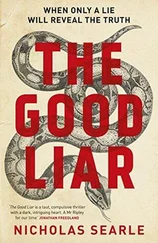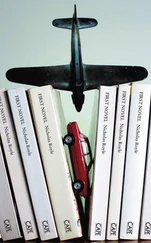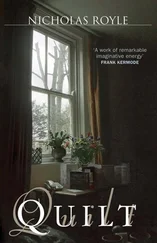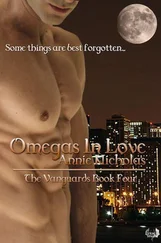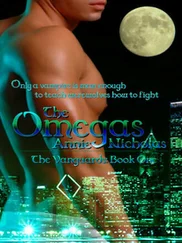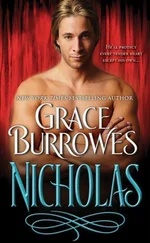It was a big old-fashioned ground with seating areas and terraces. Every available place was occupied. As I walked, blinking in the bright light, into the middle of the vast pitch, the hush that had fallen at my appearance became a murmur that soon grew to a roar of deafening volume. Those who were sitting rose to their feet, tens of thousands of them, wronged citizens, they believed, whose King had been assassinated in cold blood by this bizarre-looking individual now brought to face justice before them.
What would happen to their City once the execution was over? A city whose raison d’être seemed to be the relentless search for their ruler’s assassin.
In an instant the crowd fell silent and my ears picked up the insistent rushing beat of a beast’s paws upon close-cut grass like a drum roll. I even knew exactly what drum roll it was. The opening bars of ‘Shave Your Head’.
I turned around and looked straight into the starved dog’s eyes as it sprang at my throat.
But the animal twisted in the air, caught by a single bullet whose report I heard a split second later as it reverberated around the stands. I stared uncomprehendingly at the felled executioner, a single smoking hole torn in the side of its mottled skull. My death had been snatched away from me.
An announcement was made over the PA but it boomed too broadly for my spinning head and the muscles and bones in my legs turned to black night and stars and I collapsed, an approving roar from the crowd battering me finally senseless.
‘You were away a long time, Carl,’ Annie said, taking my hand as we skipped down the last of the steps out of the ground. Behind us the Maine Road faithful could still be heard celebrating City’s eighth win in a row. From the Kippax they gave full voice to time-honoured Blues songs and jeered the visiting fans filing out dejectedly from the North Stand.
‘I know,’ I said, relishing the taste of the November night air, a tang of gunpowder mingling with the petrol fumes and hot dog clouds. It was all real .
We walked beneath the mist-shrouded orange lamps of Moss Side’s grid of streets, linking arms and talking quietly. I glanced down back entries and Annie reassured me each time something seemed to shift in the shadows.
‘There’s nothing there,’ she’d say, or, ‘It’s just a dog.’
Just a dog.
We headed towards Rusholme, our goal a relaxing beer and curry. On Great Southern Street a police van crawled along in the traffic snarl-up and I tensed when barking erupted from the back of the van.
‘It’s all right,’ Annie said, putting her arm around my back.
The van rocked from side to side. As we overtook it I looked in at the policemen in the front. They looked complacent, unconcerned about the restless dogs. I shuddered as I pictured the carnage that would be inevitable if the doors were to spring open.
‘We’re quite safe,’ Annie said. ‘They’re on our side.’
‘They don’t look like it,’ I said, eyeing the officer in the passenger seat, the way he ran his nail-bitten finger over his lip.
I hadn’t been as lucky on the motorway as I’d thought I’d been. I never saw my car after the crash, but apparently it looked less like a motor vehicle than an abstract sculpture. Although I had only broken a few minor bones, I lost a lot of blood from lacerations in my neck and side. There had been a dog in the car that hit mine from behind and somehow as our two cars meshed together and cartwheeled across the three lanes the dog had become entangled with me. The shock of the impact and the ordeal I went through waiting for assistance and being cut out of the wreckage took its toll in other ways. As Annie said, I was away for a long time. In a coma, thanks to a substantial blow on the head.
In another place, as I explained.
When I finally came back after more than two months, apparently I was babbling, wanting to know what had happened, why they’d shot the dog, why hadn’t they let it tear me to pieces? I’d prepared myself for the end and they’d offered it to me on a plate before taking it away again.
Annie had come to the hospital as soon as they found her phone number in the back pocket of my jeans and gave her a ring. She had sat by me and talked to me for days on end, forcing herself to remember tiny details of our short time together that might break through the barrier my mind had erected.
‘They even got me to try ringing you, talking to you on the phone while someone held the receiver to your ear. We’d spent so little time together and part of it had been on the telephone just talking. The doctors thought it was worth a try.’
‘What did you say on the phone?’ I asked her.
‘I wasn’t sure this was such a good idea, but the doctors thought I ought to appeal to you for help, say that I needed you, that it was terribly important.’
‘You got through, Annie. You got through.’
She laughed. We could laugh about it now. ‘But you never got back to me,’ she answered.
By now we were on the Curry Mile and we’d ordered. The waiter brought us a huge jug of Cobra beer and Annie poured two glasses.
‘One of the doctors said there was, and I quote, “a fuck of a lot going on” in your head,’ she said.
‘Or if he didn’t, he should have done,’ I said. ‘I wonder how they knew.’ I recalled White Coat and Gledhill in King’s Hospital and then the man in the white coat in the hospital-like interior of the football ground. Green tiles, paved corridors.
‘They knew. They know these things.’
We grinned and drank more beer.
‘Good stuff,’ I said, looking at the golden liquid.
‘The best,’ Annie confirmed.
We were quiet for a moment. In the weeks since I’d been back, we’d talked around the whole thing a great deal and slowly it was making sense, to Annie as well as to me. They said it would take me a while to get back to full strength. Indeed, as far as my mental condition was concerned, I was suffering from frequent anxiety attacks. Whenever I walked under a railway bridge at night and heard a freight train rattle overhead, or crossed a bridge over a canal and happened to look down, I would go weak at the knees and start shaking.
As for finishing Un Régicide , that would have to wait.
‘You battled long and hard to come out of the coma,’ a doctor had said to me, ‘so it’s no wonder you should still be feeling the repercussions of that struggle.’
I tried to avoid walking through the interlocking streets of Moss Side at night unless Annie was with me: it was a little bit too much like taking a walk through the coils of my brain. A grey area indeed. I had considered selling the shop and moving back to Manchester. Annie was happy to look after me until I felt myself again, she said. But after a week or two, I realised I needed to know my flat and the shop were there to go back to when I was ready. Consequently, I planned and looked forward to a grand reopening perhaps in a few weeks’ time.
‘Let’s drink to your mother,’ Annie said, raising her glass.
‘Too right,’ I agreed. ‘To Mum.’
Without her I might still have been stuck in the City. My mother’s spirit had broken after my father’s suicide and she had spent many years in hospital, emerging only when the government’s Care in the Community programme kicked her out to fend for herself. She went to live in a sheltered housing project and hardly spoke a word to anyone. When Annie went to her and explained how badly I needed her help, some door must have opened in her mind and she agreed to come. She had never harboured any ill will towards me but equally was oblivious to any emotional damage I might have sustained as a result of the suicide.
Читать дальше
